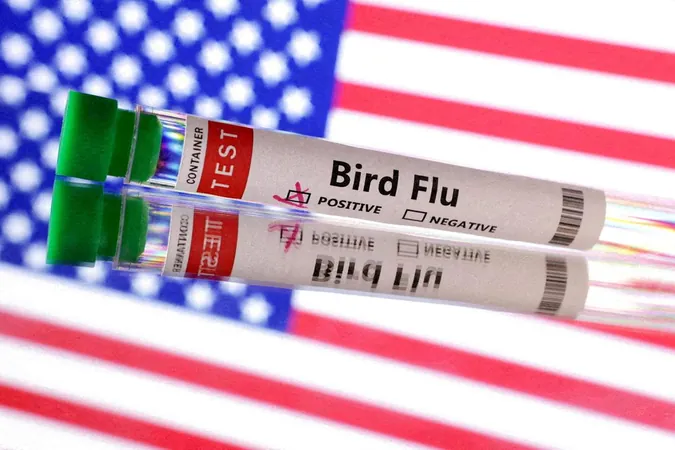
US Invests $211 Million in mRNA Vaccine Development Amidst Growing Bird Flu Concerns
2025-01-16
Author: Ming
US Invests $211 Million in mRNA Vaccine Development Amidst Growing Bird Flu Concerns
In a pivotal move to combat potential bio threats, the Biden administration announced on January 16 that it will allocate $211 million to accelerate the development of mRNA vaccines specifically targeting emerging diseases, including the bird flu. This decision comes as the nation grapples with rising avian influenza cases, raising alarms about the possibility of a new pandemic.
Since the outbreak of avian influenza in 2024, there have been 67 reported infections in the United States. Tragically, one elderly man in Louisiana succumbed to the virus earlier this month. Although the virus has not been confirmed to spread between humans, health experts are on high alert. The fear is that avian influenza could merge with seasonal flu strains, resulting in a mutant strain that could be highly contagious, thereby posing a serious threat to public health.
Xavier Becerra, the U.S. Secretary of Health and Human Services, emphasized the administration's commitment to addressing emerging disease threats through this investment. Notably, major pharmaceutical companies like Moderna and Pfizer are already developing mRNA vaccines designed to counter the bird flu, utilizing the same innovative technology that proved to be effective against COVID-19.
Moderna has been particularly active in this realm, having received a significant portion of funding—$176 million in July 2024—to support its vaccine research efforts. In addition, the United States maintains a stockpile of millions of doses of traditional H5N1 vaccines, which, although based on older viral strains, are expected to provide protection against current threats.
As part of the effort to understand and control the bird flu outbreak, the Centers for Disease Control and Prevention (CDC) has announced that all positive influenza A tests, especially from hospitalized patients, will now be prioritized for immediate testing to verify if the H5N1 strain is present. Dr. Nirav Shah from the CDC highlighted that rapid subtyping will help determine the nature of the influenza virus and enhance understanding of infection routes and exposures.
A stark reminder of the virus's potential danger came from the global statistics, where nearly half of the recorded 954 human cases of H5N1 since 2003 have resulted in fatalities, according to the World Health Organization.
Looking ahead, there are concerns regarding the incoming administration and its approach to public health, especially with Donald Trump's nomination of Robert F. Kennedy Jr. for health secretary. Kennedy has been a prominent critic of vaccines, including mRNA technology, which many scientists believe is crucial in mitigating future pandemics. Additionally, his past advocacy for raw milk consumption raises eyebrows, as it has been linked to avian flu contamination risks.
With these developments, the U.S. government's intensified focus on mRNA vaccine development could mark a significant turning point in the fight against infectious diseases, as public health authorities strive to stay one step ahead of potential outbreaks.



 Brasil (PT)
Brasil (PT)
 Canada (EN)
Canada (EN)
 Chile (ES)
Chile (ES)
 Česko (CS)
Česko (CS)
 대한민국 (KO)
대한민국 (KO)
 España (ES)
España (ES)
 France (FR)
France (FR)
 Hong Kong (EN)
Hong Kong (EN)
 Italia (IT)
Italia (IT)
 日本 (JA)
日本 (JA)
 Magyarország (HU)
Magyarország (HU)
 Norge (NO)
Norge (NO)
 Polska (PL)
Polska (PL)
 Schweiz (DE)
Schweiz (DE)
 Singapore (EN)
Singapore (EN)
 Sverige (SV)
Sverige (SV)
 Suomi (FI)
Suomi (FI)
 Türkiye (TR)
Türkiye (TR)
 الإمارات العربية المتحدة (AR)
الإمارات العربية المتحدة (AR)